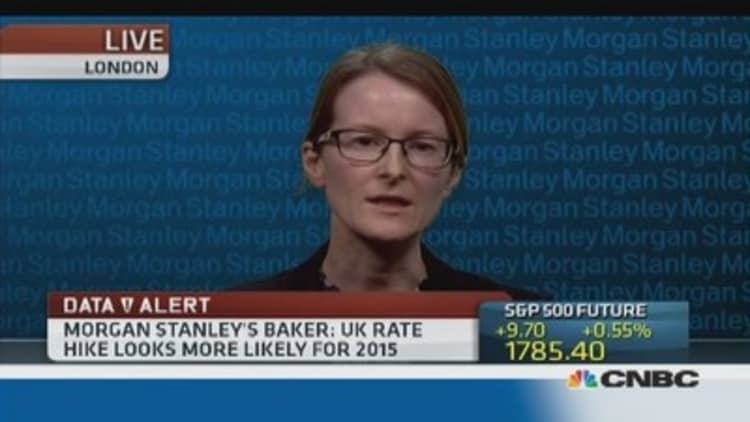
First, the good news – the UK has recorded its best annual growth since the credit crisis hit and now looks like the strongest economic recovery in Europe.
The UK economy grew by 1.9 percent overall in 2013, according to preliminary estimates on Tuesday. This should make it Europe's fastest-growing economy in 2013, and marks a resurgence that has outstripped government and Bank of England predictions.
Yet there are still potential nasty surprises in the woodshed.
(Read more: UK economy records fastest growth in 6 years)
Of the 0.7 percent growth in the last three months of 2013, services contributed 0.6 percent, led by business and financial services with 0.4 percent, and just 0.1 percent was contributed by manufacturing – suggesting that the government's much-vaunted "March of the Makers" initiative it launched last year has not been successful. Construction output shrank during the quarter, belying optimistic noises from property companies.
(Read more: David Cameron calls for 'march of the makers' home)
"More must be done to shore up the foundations of this recovery if it is to be a lasting one. Unless we do much better on the three 'T's - training, transport infrastructure and trade support - our aspirations for investment at home and success around the globe cannot be achieved," said John Longworth, director general of the British Chambers of Commerce (BCC), the business lobby group, in a statement.
Another sobering component of the figures is the decline in output per hour. As unemployment has fallen to 7.1 percent, this suggests that real wages are falling – which could mean that, if interest rates go up sooner than expected, the middle classes will be further squeezed.
Economists are already revising their views on when interest rates will rise from their current historic low of 0.5 percent. Mark Carney, governor of the Bank of England, said that he would consider raising them when unemployment hit 7 percent, which now looks likely to happen sooner rather than later. While this "forward guidance" is not an iron-clad rule, better-than-expected economic data is still more likely to lead to an earlier interest rate rise.
With an election ahead next year, the government will want the man in the street to feel the benefit of the recovery. The opposition Labour Party were quick to go on the offensive, with Shadow Chancellor of the Exchequer Ed Balls saying: "For working people facing a cost-of-living crisis this is still no recovery at all."
(Read more: BoE keeps an eye on forward guidance: Carney)
"The growth spurt that we saw in late-2013 may be as good as it gets for a while," according to Chris Williamson, chief economist at Markit, in a note.
"Bank lending also remains frustratingly weak."
He concluded that the U.K. recovery is more likely to be "subdued" than derailed.
"We mustn't pat ourselves on the back for a recovery that is merely good, when what we need is a recovery that is truly great," Longworth said.
- By CNBC's Catherine Boyle. Twitter: @cboylecnbc.


